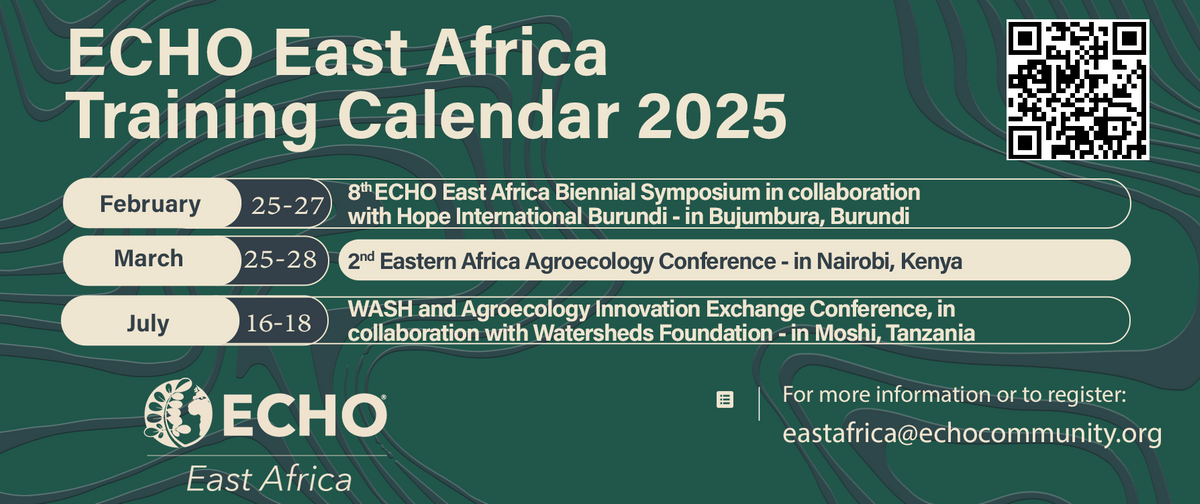East Africa Regional Resources
About the Impact Center
This center was developed to provide ECHO services to help those in East Africa who work with the poor more effectively, especially in agriculture and alternative methods. ECHO East Africa is a basic training center providing technical assistance to help organizations and community development workers work more effectively to reduce hunger.
Services
- Conduct research and development on locally appropriate sustainable agriculture practices
- Collaborate with, and provide networking opportunities for, development agencies working in East Africa
- Provide garden displays and demonstrations of agricultural options
- Provide agricultural resources for study
- Demonstrate alternative training methods, including creative collaboration and exhibitions
- The ECHO seed bank provides packaged seeds, as well as seed exchange opportunities and seed conservation education
- Training for home gardens (organic gardens, kitchen gardens, gardens, bags and manufacture of peat)
- Training and visits to fruit tree nurseries
- Organization of conferences, workshops, forums, exchange visits, and training in best practices
- Network between farmers and other development partners
- Conduct agricultural fairs
Contact:
Charei Munene
ECHO East Africa Impact Center
P O Box 15205
Arusha Tanzania
eastafrica@echocommunity.org
Upcoming events: East Africa
National seed bank training in Burundi
Thu, 24 April 2025 » Fri, 25 April 2025
Faith Center, Burundi
Greetings East Africa network members! ECHO EA and Hope International Burundi are conducting a National seed bank training in Bujumbura. You are cordially invited to participate or send participants. The seed bank training is hosted by Mothers Union Burundi. We encourage you to spread the word to all interested parties in Burundi and ask you to sponsor trainees. We are looking for partners who can cater for some of the training costs
Innovation Exchange Conference, hosted in collaboration with ECHO East Africa and Watersheds Foundation
Wed, 16 July 2025 » Fri, 18 July 2025
Uhuru Hostel & Conference Centre in Moshi, Kilimanjaro, Tanzania
Kind Greetings from ECHO East Africa. We are delighted to ask you to participate and present at our upcoming Innovation Exchange Conference organised by ECHO East Africa in collaboration with the Watersheds Foundation. The conference will focus on Water, sanitation, and hygiene (WASH), Sustainable Agriculture and Appropriate Technologies. This event will take place between 16th to 18th July 2025 at the Uhuru Hostel & Conference Centre in Moshi, Tanzania. Innovative ideas by groups funded ...
Latest Resources: East Africa
Harvesting Water with Hafirs
Hafirs are shallow, excavated basins that collect and store rainwater for various uses, such as irrigation, livestock watering, and domestic needs. Hafirs effectively capture runoff during the rainy season for use in the dry...
Gambling in the Garden: Pesticide Use and Risk Exposure in Ugandan Smallholder Farming
Elina Andersson, Ellinor Isgren, Gambling in the garden: Pesticide use and risk exposure in Ugandan smallholder farming, Journal of Rural Studies, Volume 82, 2021, Pages 76-86, ISSN 0743-0167, https://doi.org/10.1016/j.jrurs...
Africa Soil Health Consortium
ASHC defines integrated soil fertility management or ISFM as : "A set of soil fertility management practices that necessarily include the use of fertilizer, organic inputs and improved germplasm combined with the knowledge o...
The effect of traditional malting technology practiced by an ethnic community in northern Uganda on in‐vitro nutrient bioavailability and consumer sensory preference for locally formulated complementary food formulae
Alowo D, Muggaga C, Ongeng D. The effect of traditional malting technology practiced by an ethnic community in northern Uganda on in-vitro nutrient bioavailability and consumer sensory preference for locally formulated compl...
Diversity of Sources of Income for Smallholder Farming Communities in Malawi: Importance for Improved Livelihood
Bhatti, M.A.; Godfrey, S.S.; Ip, R.H.L.; Kachiwala, C.; Hovdhaugen, H.; Banda, L.J.; Limuwa, M.; Wynn, P.C.; Ådnøy, T.; Eik, L.O. Diversity of Sources of Income for Smallholder Farming Communities in Malawi: Importance for I...
About East Africa
Food insecurity has increased significantly in East Africa due to the rapid increase in population, with an increase of 150% by 2050. Over 40% of children in East Africa are malnourished. The largest number of these children are orphaned and living in difficult circumstances. Most of the rural population lives in poverty, relying on a subsistence lifestyle. Some of the reasons for this situation include:
- A High rate of loss of yield
- Underdeveloped, weak markets, farmers lack the infrastructure to improve thier value chains
- Minority farmers and herdsmen in the region, don't have adequate access to agricultural services, continuing education or access to formal training
- Increased pressure forcing families to cultivate a little land, which results in land degradation and loss of sustainability in food production
- Drought, especially in arid pastoralist areas.
- Deforestation
- Flooding
- Climate
